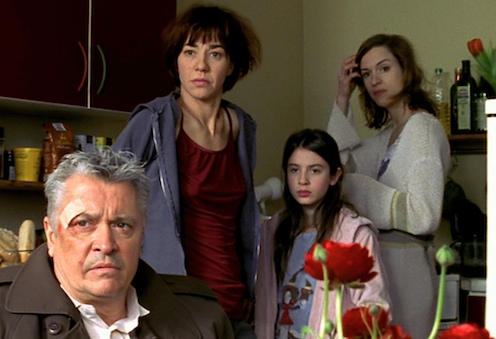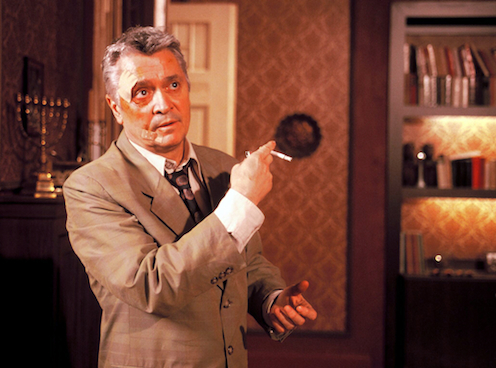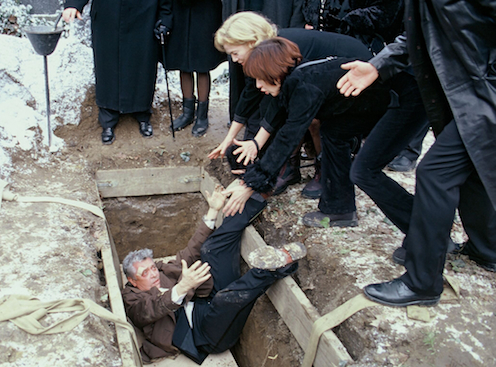Go for Zucker! - An Unorthodox Comedy
Full Description
Jaeckie Zucker is up to his ears in debt, again. This time it’s worse than usual for the roguish, wisecracking, hard-drinking Berlin pool shark formerly known as Jakob Zuckermann. Jaeckie happily left everything Jewish behind him decades ago, when his mother and brother fled to the West just before the Berlin Wall was built. When word comes that his mother has died and left him a sizeable inheritance, it’s a stroke of luck...but there’s a catch: Jaeckie must first reconcile with his long-estranged brother Samuel, who has become an Orthodox Jew in Frankfurt and is arriving, family in tow, for a traditional funeral and shiva at Jaeckie’s house. The madcap adventure that follows finds Jaeckie and his equally irreligious wife desperately trying to "pass" as observant, while Jaeckie attempts to ditch the family so he can play in a high-stakes pool tournament.
Politically incorrect, ironic and utterly contemporary, what makes Go for Zucker! such a standout is that, while in the irreverent mode of Mel Brooks and Larry David, this is a comedy from Germany--daring to present Jews in a guilt-free context beyond the Holocaust. Berlin-based director Dani Levy (Without Me, SFJFF 1994; Meschugge, SFJFF 1999), himself a Swiss Jew, brings together a brilliant and funny cast including German superstar Hannelore Elsner as the unflappable wife who must bone up on all things Jewish, and Golda Tencer, the doyenne of Polish Jewish theater, as the sister-in-law who sees through the ruse: "This house is as kosher as a pork chop!" And at the center of the whirlwind is Henry Hübchen, who in Jaeckie has created a lovable, infuriating scoundrel who breaks every taboo. And so does the movie.
Filmmaker Bio(s)
Dani Levy was born in Basel in 1957, and has lived in Berlin since 1980. After spending a wild childhood and youth as circus clown, acrobat and guitarist in a rock band and with a mediocre (so he claims) high school diploma in hand, Levy worked in theater in Basel (1977-79) and Berlin (1980-83), before making his debut film DU MICH AUCH (Same to You, 1986), for which he won the prize for Best Film at the International Comedy Festival in Veyey. He received further awards for his 1988 film ROBBYKALLEPAUL (Audience Award at the 1989 Max Ophuls Festival) and his 1991 feature I WAS ON MARS (FIPRESCI Special Distinction as Best Film at San Sebastian).
In 1993, Levy won the Hypobank Director’s Prize at the Munich Film Festival with his WDR-commissioned short film OHNE MICH (1993), which launched a spate of movies against the resurgence of right-wing radicalism in Germany. A year later, together with Stefan Arndt, Wolfgang Becker and Tom Tykwer, Levy founded the production company X Filme Creative Pool. STILLE NACHT (1995), the first film made under the aegis of X Filme, ran in the International Competition of the 1996 Berlin Film Festival.
In 1997, after ten years of work on the script and development, Levy devoted himself to making a film that was very close to his heart: MESCHUGGE (The Giraffe). This complex thriller premiered in 1998 at the Toronto Film Festival. In 1999 MESCHUGGE was awarded, along with LOLA RENNET (Run Lola Run), the Bavarian Film Prize and the Award for Best Cinematography. The same year, commissioned by the automotive industry flagship city of Wolfsburg, Levy shot the first 360-degree feature film. DAS GEHEIMNIS DER SICHERHEIT, on location in Iceland and Munich.
In spring of 2001. Levy made his first video for the song "Adriano -- Letzte Warnung" performed by the Brother Keepers, a collaborative group of 14 Afro-German musicians (including Xavier Naidoo, Samy Deluxe, Tyron Ricketts and Sekou). The music video went on to become one of the most-played clips for 2001 on both VIVA and MTV. With his 2002 family drama VATER (I’m the Father), Levy painted a highly topical and vivid portrait of an ambitious generation that is forever at risk of coming to grief over its own aspirations.
In September of 2004, Dani Levy’s street theater piece "Freie Sicht aufs Mittelmeer" had its successful premiere. Commissioned by Theater Basel, the filmmaker staged a tour of his hometown in the form of a story of two unequal brothers, set against the background of left-wing culture and political unrest in Basel in the eighties and nineties.
Director(s)
Country(ies)
Language(s)
w/English Subtitle
Release Year
Festival Year(s)
Running Time
90



